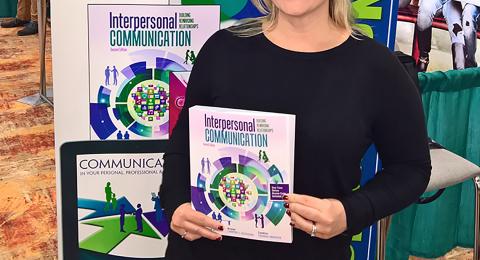Oswego professor, co-authors rework book on interpersonal communication
Office of Communications and Marketing
Published
OSWEGO -- SUNY Oswego communication studies professor and ACE Fellow Kristen Eichhorn and two co-authors began talking about updating their book on interpersonal communication only a few years after it first appeared in 2008, aiming for a deeper dive into emotions, perceptions and the ever-evolving impact of the digital era on how humans connect.
Kendall Hunt, a provider of educational products and services, recently published the second edition of "Interpersonal Communication: Building Rewarding Relationships" by communication studies professors Eichhorn, Melissa B. Wanzer of Canisius College and Candice Thomas-Maddox of Ohio University.
"This book is really a complete overhaul. There's not one chapter that looks like it did in the first edition. This feels like a brand-new book," said Eichhorn, who's working this year at Cornell University for her professional-development placement as one of only 29 American Council on Education 2016-17 Fellows nationwide.
The first edition -- adopted as a textbook at dozens of colleges from Massachusetts to California -- did explore computer-mediated communication. Yet, for example, the research around social media and online personalities has advanced rapidly in an era where an interpersonal scenario such as a blind date could seem quaint.
The book's new edition accepts that initial romantic encounters most likely are preceded by a good deal of digital homework. The first face-to-face meeting "really gets flipped on its head when you can Google someone and know a lot about them," Eichhorn said.
College students have greeted Eichhorn's "Interpersonal Communication" course and book with enthusiasm over the years, she said, because they can identify with so much of the content, especially the roles and emotions that infuse family, friendships and romantic relationships. There is a new chapter on the role emotion plays in interpersonal contact.
In the class, "we do a lot of inquiry-based learning, where students investigate on their own," she said. "It's really fun for the students, because it's their lived experience."
The second edition also explores historical and theoretical foundations around the development of the self, professional and organizational relationships, communicating about health, perception and listening, nonverbal communication, the dark side of relationships -- deception, jealousy, verbal aggression -- and much more. Each chapter begins with objectives, scenarios and an overview, and concludes with a summary, discussion questions, opportunities for self-assessment, key definitions and references.
Bullying language, the influence of Twitter, best practices to avoid verbal or online pitfalls, impacts of healthy and rewarding relationships -- those topics and more make the book useful beyond the classroom, Eichhorn said.
James A. Cox of the Midwest Book Review agreed: "... A work of impressive yet readily accessible scholarship, 'Interpersonal Communication' is highly recommended for academic and community library reference collections, college level courses in communication, and to non-specialist general readers with an interest in interpersonal communication as a means of establishing and maintaining personal relationships in our increasingly depersonalized society," he wrote.



